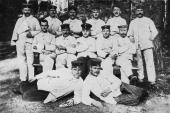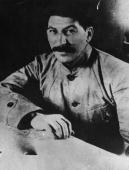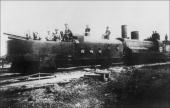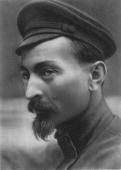

|
1918 January
January 8th In 1918, President Woodrow Wilson presents fourteen specific war aims for World W ar I, and these later become the basis of the Treaty of Versailles which ends the war. In 1918, The Council of People's Commissars appoints J. V. Stalin a member of a commission for working out measures in regard to the food policy of the Soviet Government. January 10-18th In 1918, Stalin takes part in the work of the Third All-Russian Congress of Soviets. January 11th In 1918, At a meeting of the Central Committee of the Party, J. V. Stalin speaks in support ol V. I. Lenin's proposal for the conclusion of peace with the Germans. January 15th In 1918, Stalin makes a report at a meeting of the Bolshevik group at the Third Congress of Soviets on a Federation of Soviet Republics. At the Third Congress of Soviets, J. V. Stalin makes a report on the national question and replies to the discussion. The congress approves a resolution on federal institutions of the Russian Republic, moved by J. V. Stalin. January 24th In 1918, At a meeting of the Central Committee of the Party where the convening of the Seventh Party Congress is discussed, J. V. Stalin speaks in favor of revising the Programme of the RSDLP(B). On instructions of the C.C. of the Bolshevik Party, J. V. Stalin conducts a conference of members of the revolutionary wings of a number of socialist parties of Europe and America. January 26th In 1918, Food Administrator Herbert Hoover, in an attempt to save meats and grain, asks the American public to voluntarily observe "wheatless Mondays and Wednesdays, meatless Tuesdays, porkless Thursdays and Saturdays." January 28th In 1918, V. I. Lenin and J. V. Stalin send a telegram to the Soviet peace delegation in Brest-Litovsk on the need for the immediate conclusion of peace with Germany. |


|



